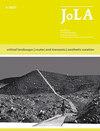Roberto Burle Marx’s Cidade Parque
IF 0.3
4区 艺术学
0 ARCHITECTURE
引用次数: 3
Abstract
Abstract The work of Brazilian landscape architect Roberto Burle Marx evidences the implementation of a new, all-encompassing landscape in urban space, conveying an unprecedented and unique image of the city conceived of as a park. Through a paradigmatic case study of Rio de Janeiro, this article discusses the modern system of green spaces designed by Burle Marx in which the rediscovery of an elevated quality of nature, one that recalls the native ecology and the essence of the urban environment, plays a decisive role in introducing the invention of a Brazilian modern landscape. By focusing on the idea of the city understood as a distinct form of landscape, Burle Marx’s Cidade Parque is ultimately the expression of a modern system of creative principles as they apply and adapt to nature and to the individual. This article therefore aims to put forth an alternative reading of Burle Marx’s work, starting at the metropolitan scale where a modern consistent continuum of public spaces was created, beginning with a rediscovery of the virgin forest.巴西景观设计师Roberto Burle Marx的作品证明了在城市空间中实施一种全新的、包罗万象的景观,传达了一种前所未有的、独特的城市形象,即一个公园。通过对里约热内卢的典型案例研究,本文讨论了由Burle Marx设计的现代绿色空间系统,其中重新发现了自然的高品质,回忆起当地生态和城市环境的本质,在引入巴西现代景观的发明中起着决定性作用。通过将城市的概念理解为一种独特的景观形式,Burle Marx的Cidade Parque最终表达了现代创造性原则系统,因为它们适用并适应自然和个人。因此,本文旨在提出对伯尔·马克思作品的另一种解读,从都市尺度开始,在那里创建了一个现代一致的公共空间连续体,从原始森林的重新发现开始。
本文章由计算机程序翻译,如有差异,请以英文原文为准。
求助全文
约1分钟内获得全文
求助全文
来源期刊

Journal of Landscape Architecture
ARCHITECTURE-
CiteScore
0.60
自引率
16.70%
发文量
10
期刊介绍:
JoLA is the academic Journal of the European Council of Landscape Architecture Schools (ECLAS), established in 2006. It is published three times a year. JoLA aims to support, stimulate, and extend scholarly debate in Landscape Architecture and related fields. It also gives space to the reflective practitioner and to design research. The journal welcomes articles addressing any aspect of Landscape Architecture, to cultivate the diverse identity of the discipline. JoLA is internationally oriented and seeks to both draw in and contribute to global perspectives through its four key sections: the ‘Articles’ section features both academic scholarship and research related to professional practice; the ‘Under the Sky’ section fosters research based on critical analysis and interpretation of built projects; the ‘Thinking Eye’ section presents research based on thoughtful experimentation in visual methodologies and media; the ‘Review’ section presents critical reflection on recent literature, conferences and/or exhibitions relevant to Landscape Architecture.
 求助内容:
求助内容: 应助结果提醒方式:
应助结果提醒方式:


